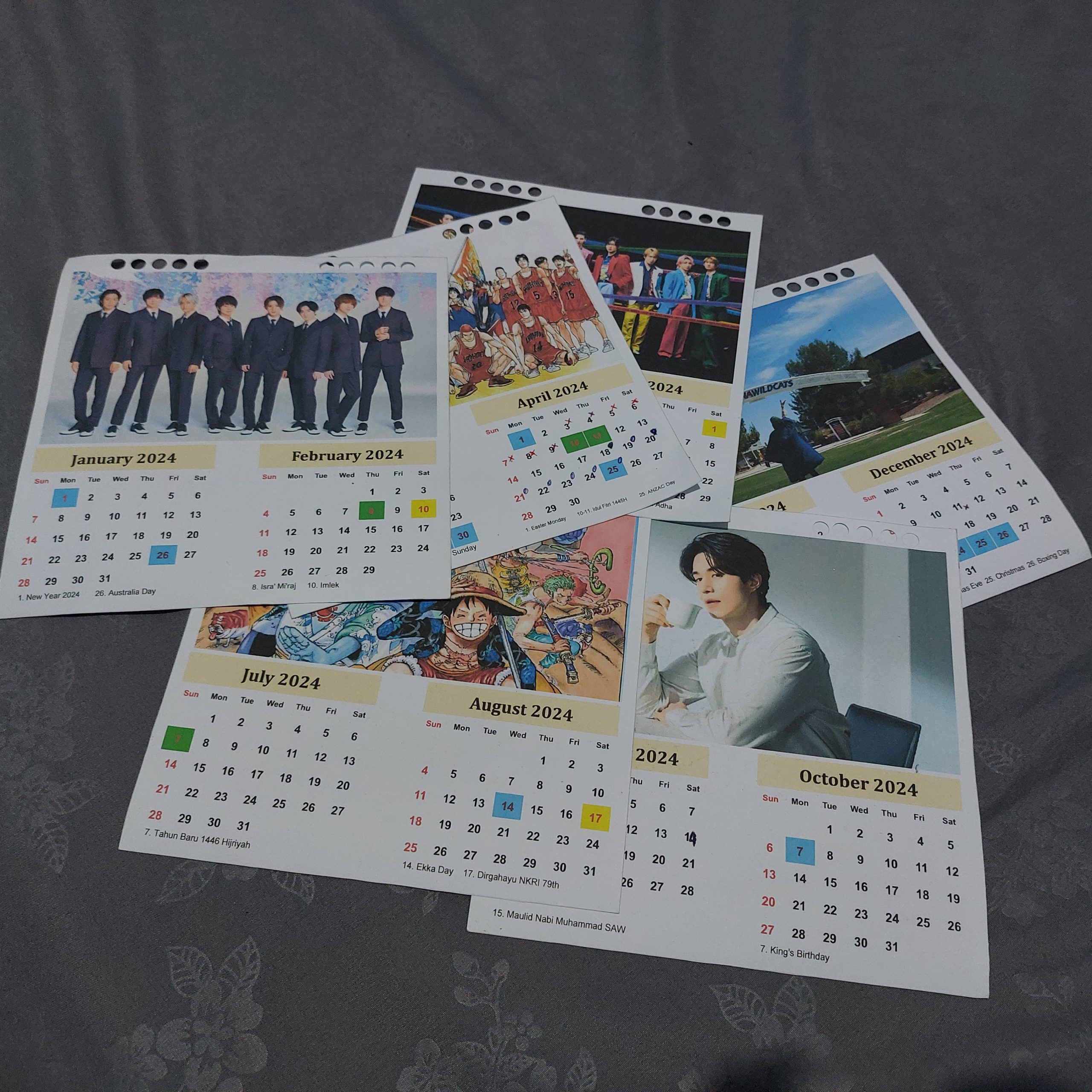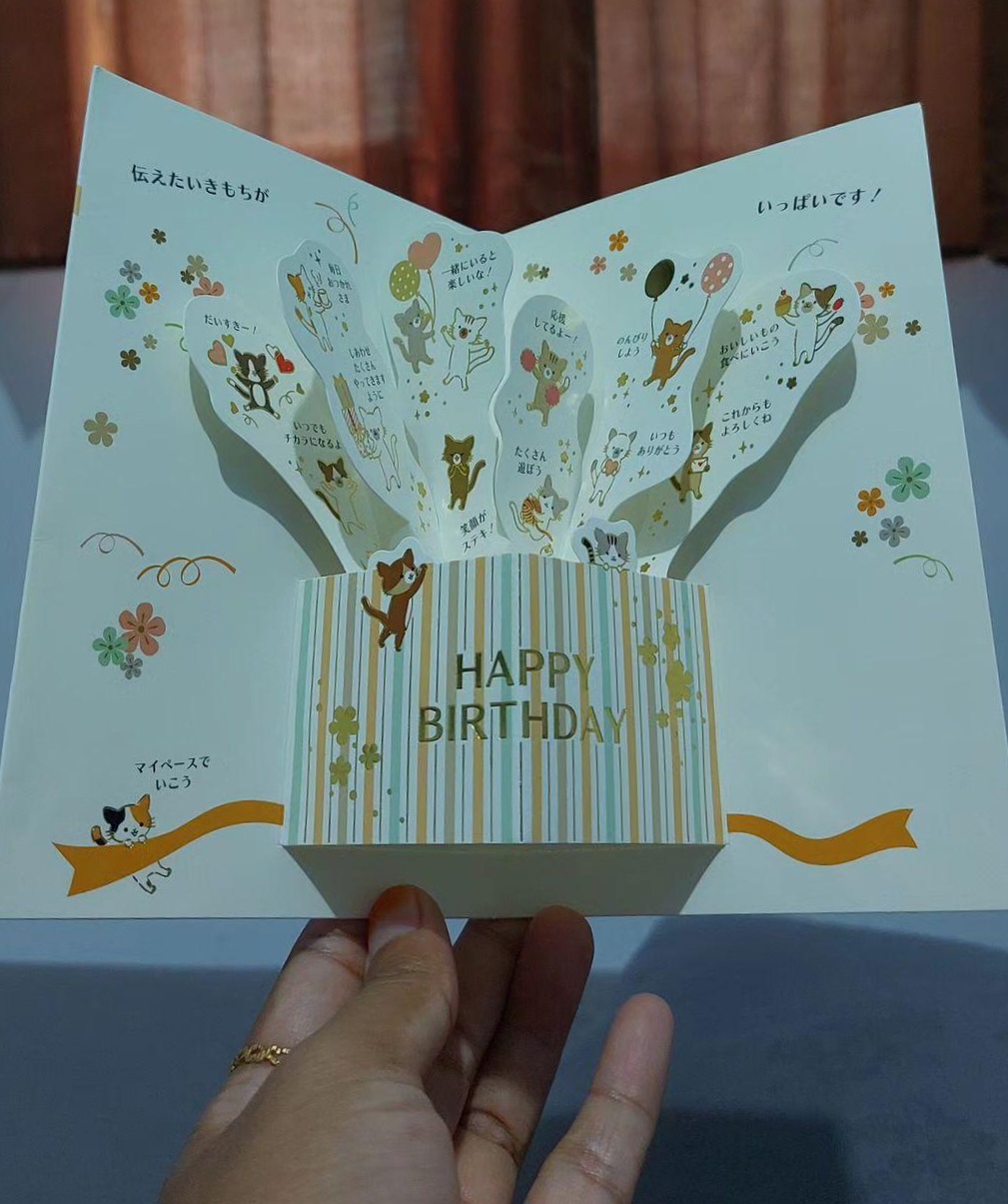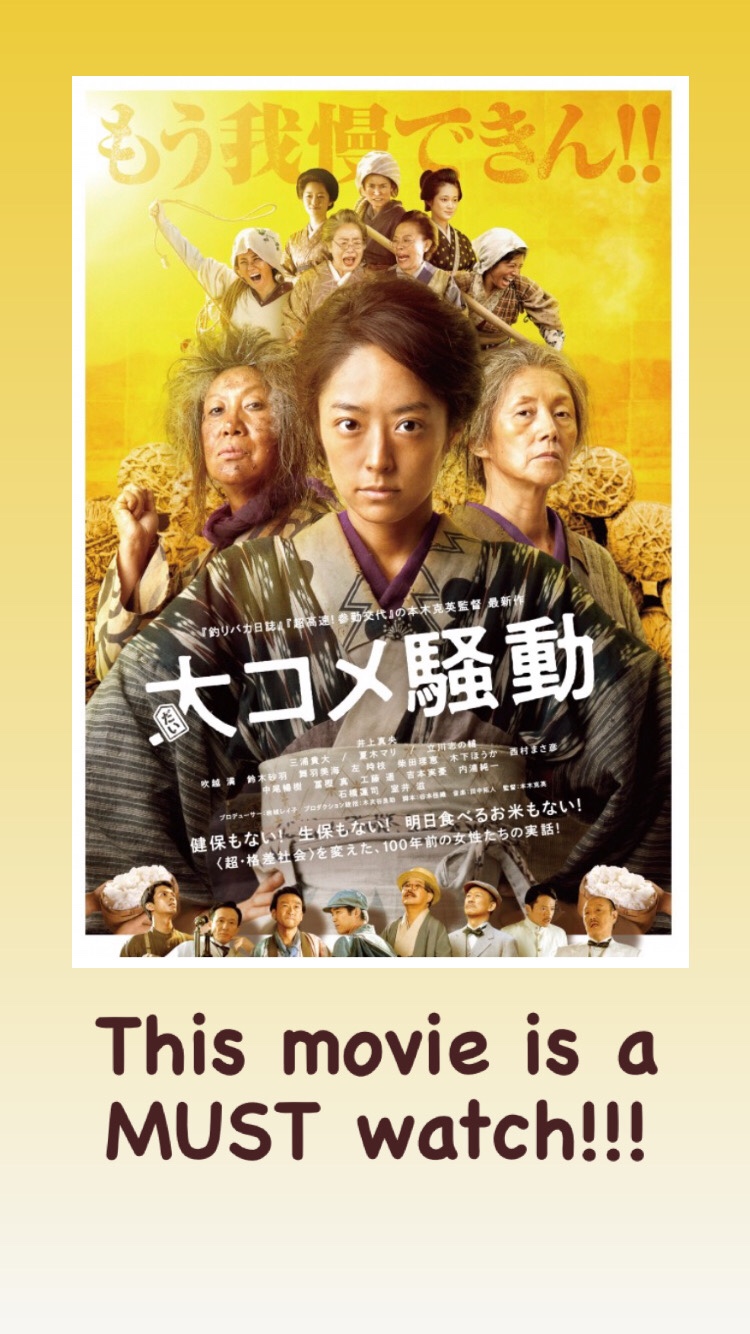 Hi, it’s been a while since the last time I posted here. Lots of things happened but if I were to tell them here, one post won’t be enough and they’ll probably be boring, so let’s just cut to the chase. As I keep watching Japanese dramas, movies, and anime, I feel like I really have to post about this one because it’s so good that I think more people should know and watch it for themselves. The title of the movie is Angry Rice Wives, or 大コメ騒動 [Dai Kome Sodo] in Japanese.
Hi, it’s been a while since the last time I posted here. Lots of things happened but if I were to tell them here, one post won’t be enough and they’ll probably be boring, so let’s just cut to the chase. As I keep watching Japanese dramas, movies, and anime, I feel like I really have to post about this one because it’s so good that I think more people should know and watch it for themselves. The title of the movie is Angry Rice Wives, or 大コメ騒動 [Dai Kome Sodo] in Japanese.
It is not set at the present. I learned that this movie was actually based on a real historical event in Japan, The Rice Riots of 1918. As the title indicated, this movie highlighted the story of the wives who got angry as the price of the rice became so high, expensive, basically unaffordable for them. I am not trying to be woke or look like a social justice warrior here, but I believe this is a really good movie, a must-watch especially for those who find it hard to understand why we need to keep talking about inequality, why we need to keep trying to create equality for people, how one issue is intertwined with another, especially when it comes to politics and poverty, and so forth. Well, I might not be using the correct terms as I’m not intelligent enough to talk about such important issues. Some people might say I should not talk about this if I feel I am not the expert, but I think I can still talk about it as a layman, no?
Well, if you’ve been reading my blog, you must have already known that I can’t help giving spoilers sometimes. So, if you hate spoilers and want to watch the movie, you can stop here. But, ugh, it’s kinda hard to talk about the issues without talking about what happened in the movie, i.e. spoilers. So yeah, let’s not beat around the bush anymore.
1) Patriarchy and Feminism
As this movie was set in 1918, as everywhere else in the world, the presence of patriarchy was so strong here. Women were considered “second to men” in the society in terms of significance even though often times it’s women who had to work hard to support the family, especially when their husband had to be away for “work” that might not bring money to support the family back at home. This issue was portrayed clearly in this movie. Most of the men in this movie had to go to a faraway place to earn a living for the family. But during their absence and before they came back and brought some money, it’s the wives who had to work to help the family to get by. In this movie, the wives had to work for the rich in the rice shipment business. They had to carry some rice, which was heavy, on their back and move it from the storage to the boats/ships on the shore so it can be shipped to war and the women used the payment to buy rice and survive. See the hardship and the unfair reality yet? The women had to cook for and take care of the kids and the whole family while also working to earn some money to make a living. The men? Away.
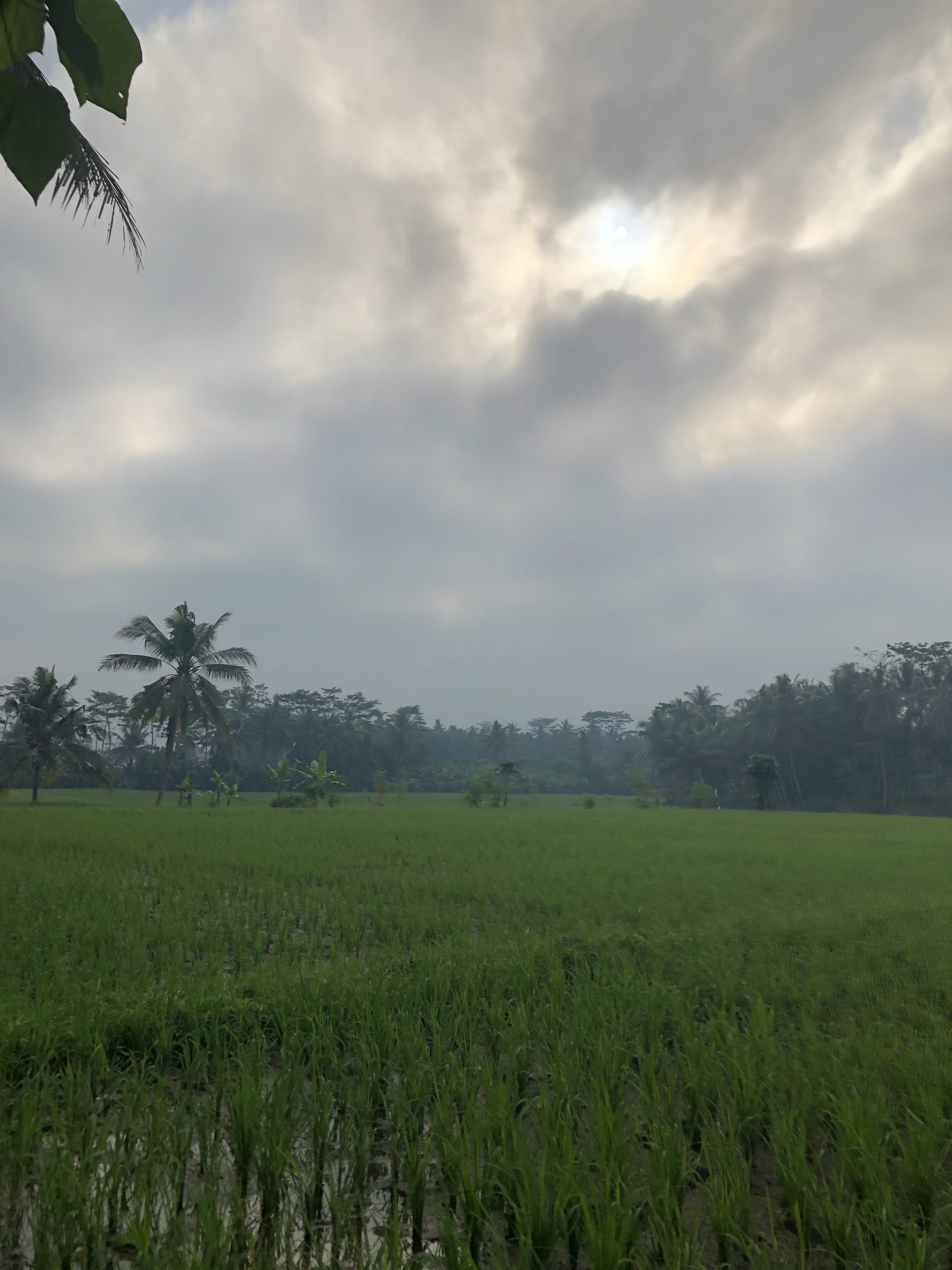 It’s still infuriating to think that to this day, women like this are still often considered “not working” and “just” housewives. They’re considered insignificant compared to men, just because they are women. Their thoughts are often dismissed, and education is considered wasted on them. Some people think women do not need to be clever. Etc. As depicted in this movie, Ito, the main character, loved learning and reading books. Her childhood friend said that she was smart and admirable. But as cliché as it was, she was married early and had to work and support her family. People thought her being smart and able to read was kinda useless in their situation. But if you watched this movie carefully, that was actually not true. Ito was actually one of the people who initiated the protest demanding the rice price to be lowered so that the family like hers could afford it.
It’s still infuriating to think that to this day, women like this are still often considered “not working” and “just” housewives. They’re considered insignificant compared to men, just because they are women. Their thoughts are often dismissed, and education is considered wasted on them. Some people think women do not need to be clever. Etc. As depicted in this movie, Ito, the main character, loved learning and reading books. Her childhood friend said that she was smart and admirable. But as cliché as it was, she was married early and had to work and support her family. People thought her being smart and able to read was kinda useless in their situation. But if you watched this movie carefully, that was actually not true. Ito was actually one of the people who initiated the protest demanding the rice price to be lowered so that the family like hers could afford it.
And guess what? Women are powerful. In a good and a bad sense. Good because as the women started to protest, it encouraged the men to take a stance too. The men got fired up and considered protesting themselves too. Bad because they still thought of women as “inferior,” i.e. if women protested, then we, men, who’re supposed to be superior, then should too. It’s as if they thought it’s something that women were not capable to do, and they’re wrong. But I guess by watching this movie, we can learn to NOT look down on women and to appreciate them more.
2) When the officers side with the rich
In this movie, as the poor women were protesting against the rich bosses and demanded them to lower the price, the police officers did not help the poor. The officers sided with the rich and kinda became their dogs. Ugh, I really hate this. A country is its people. If these officers believe their job is to protect and serve the country, then they must protect and serve the people, NOT the rich or the corrupt government and businessmen. A country’s people include the poor too!!! But, well, like in some other countries, unfortunately, the reality is not like that. It seems like a common phenomenon that the poor always gets oppressed by the rich and the officials siding with them. This is just so sad. It infuriates me as I can see that this also happens in my country. We the people are often helpless, powerless, and hopeless as we are seeking for justice. But often times we get punished for even speaking up about it. And I feel so sad that I can help nothing more than occasionally talking about it on my social media platforms. And what’s worse is that there are always people who defend and make excuses for the government and attack us. And when we get furious and curse, they say we don’t have manners. It’s funny that they don’t hear us and refuse to see our points when we express them “politely” but then they make a fuss about our swearing saying we don’t need to be rude to show the essence of our arguments. So they notice our points only when we swear, huh? And at that time, instead of returning to the main topic, they divert the discussion to our swearing. They simply don’t want to talk about the main issue, huh? And by the way, this reminds me of a quote by Russel Brand. He says, “When I was poor and complained about inequality they said I was bitter; now that I’m rich and I complain about inequality they say I’m a hypocrite. I’m beginning to think they just don’t want to talk about inequality.” Damn, it’s so true. And it’s so funny that they think they can troll but we can’t cuss.
Well, I’m sorry, I get carried away and remember my personal real-life conflicts, but allow me to say at least this: They are such ignorant privileged bitches. A scumbag.
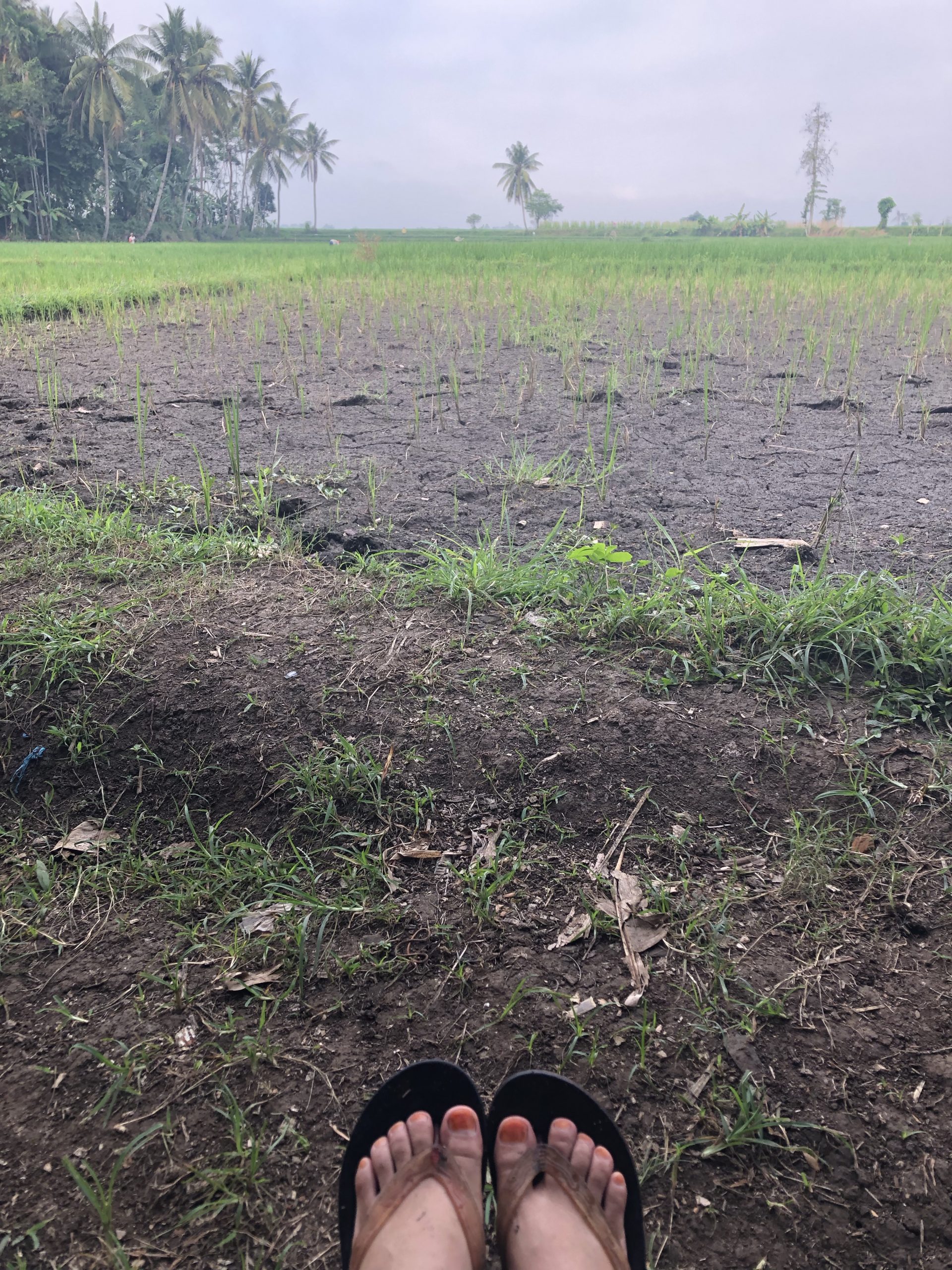 3) When you’re smart but you’re poor
3) When you’re smart but you’re poor
Aside from Ito, the smart girl who was married, had to work to support her family, and initiated the protest against the rich, there was also a smart little girl in this movie. But her family was poor. She wanted to work to help her Mom. And then she had to steal some rice so they didn’t starve. She ended up dying 🙁 Ito’s little son was quite clever, too. He said he wanted to be a soldier and go to war, risking his life, so he could get some money and his family did not have to starve and could eat properly.
Well, this somehow reminds me of my own situation. I was poor, right? I relied a lot on scholarship for my education. I wrote it before (here and here). It is sad to think that smart people can’t get better chances at improving their lives only because they are poor. And this story does not happen only in the movie. There are many in real life. I might be lucky that I could continue to study abroad and get a PhD by a scholarship despite being poor myself, but there are many that are not as lucky as I have been. I am aware of this. But we can’t forever rely on luck to get a better life, right? We need a better system so more people can get equal opportunities to education and to improve their lives, no?
4) When the rich turns the poor against one another
This is illustrated so clearly in this movie. When the women started to protest and tried to find more allies, the police and the rich made it look like one party was betraying the others. First, when Ito tried to get Kiyoshi’s grandma’s support, the police caught someone in Ito’s group so when Kiyoshi’s grandma’s group arrived at the promised place to protest, Ito’s group was not there as they went to the police station to save their captured friend. The police then told Kiyoshi’s grandma that Ito was just provoking her to protest and did not actually want to join the protest herself as she was playing it safe. Kiyoshi’s grandma felt betrayed and got angry.
Then, at another protest, one of the bosses persuaded Ito to stop protesting. She tried to bribe Ito by selling her rice with lower prices. She told Ito that her neighbors, other women who were protesting with her, actually fared better than her. She said they simply did not want to help Ito and that’s why Ito had to save herself and family by accepting the offer, i.e. stopping the protest so only she could buy the rice at lower prices. Ito’s idealism got swayed as she started to believe the boss’s words. She got bitter thinking that her neighbors’ condition was better but did not help her. Well, I can’t really blame Ito. After all, we can’t eat idealism and morals. We can’t live only with idealism and morals. We need to eat to survive. And this is what Ito saw. She knew it was wrong of her to betray their fight, but she needed to feed the kids that she loved. She had to betray her idealism for her beloved.
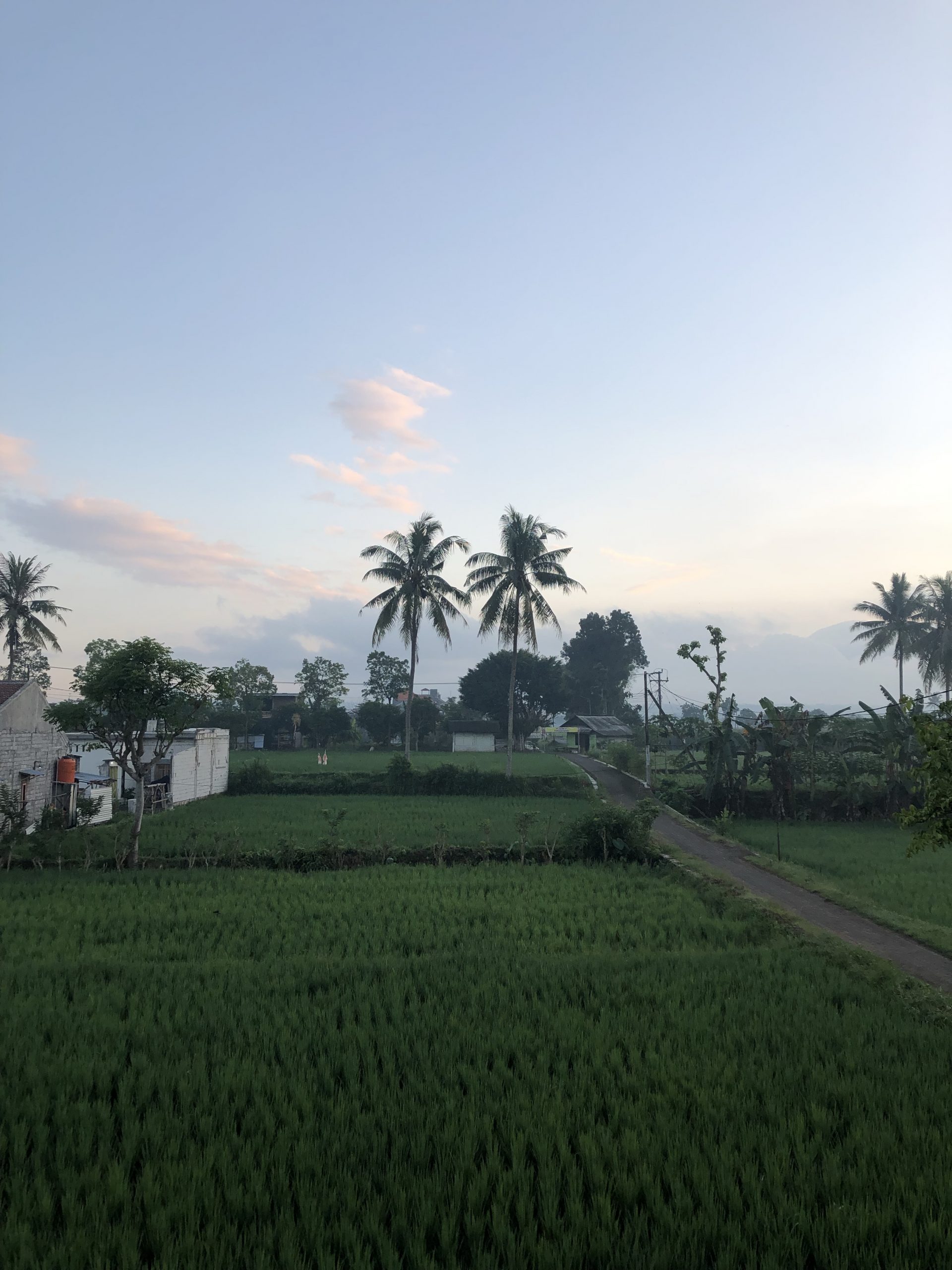 Later, when the little smart girl was dead as she was trying to steal some rice, the women protested again. But guess what? The boss told them about Ito’s betrayal, how she bought the rice at lower prices. And the women were, of course, angry at her. Ito knew she deserved their anger. She felt guilt, but she was helpless at the same time. At that time she needed to choose between keeping the fight with her neighbors and stopping the fight so her family did not starve. She chose the latter. And really, we are not one to judge. Instead of pouring our fury by putting the blame on Ito for not keeping her idealism, we should be angry at people that drove her into that corner, the people who starved her, the ones who made it difficult for her to stay at the right path only to survive. Right?
Later, when the little smart girl was dead as she was trying to steal some rice, the women protested again. But guess what? The boss told them about Ito’s betrayal, how she bought the rice at lower prices. And the women were, of course, angry at her. Ito knew she deserved their anger. She felt guilt, but she was helpless at the same time. At that time she needed to choose between keeping the fight with her neighbors and stopping the fight so her family did not starve. She chose the latter. And really, we are not one to judge. Instead of pouring our fury by putting the blame on Ito for not keeping her idealism, we should be angry at people that drove her into that corner, the people who starved her, the ones who made it difficult for her to stay at the right path only to survive. Right?
And you know what’s worse? The little smart girl who was dead was actually Ito’s little son’s friend so he was also protesting. But when the boss revealed Ito’s betrayal, he came to hate Ito. Can you imagine the ordeal? You did a bad thing not because you liked it but because you thought it’s the only option you had, all for the son that you loved so much. You put aside your idealism and pride for your beloved kid only to find that the kid came to hate you for that very thing you did. I feel so sorry for Ito 🙁
But you know what? I think the rich does not really want to help the poor. The rich just wants to be richer and wants the poor to stay poor so the rich can stay rich. It’s easy to turn people against one another when they are poor. The rich wants the poor to stay poor also because when you are poor, you’ll be too busy trying to fulfill your basic needs to survive and get by. When you’re poor, you won’t have time and energy left to think about inequality, about unfairness, about protesting, etc. When you’re poor and oppressed, you’ll think million times before you protest because the outcome is not guaranteed to be good or successful. Often times, it simply makes the situation worse and harder for you. And of course you don’t want it.
So yes, it’s hard to fight when we’re poor. We can’t really rely on the rich who wants us to stay poor. We can only hope that the rich with some sense would be willing to fight for us, if not along with us. But really, from a pov of a poor person myself, sometimes I just want them to fight FOR us. It’s not that we don’t want to fight along with them or refuse to join their fight ourselves. No. But like I said, sometimes we’re simply so exhausted from surviving alone that fighting would simply exhaust us more, not to mention that often we cannot afford the consequences. That’s why it infuriates me when some so-called SJWs (Social Justice Warriors) with woke complex blame or guilt-trip us saying we don’t work or fight hard enough, saying we don’t really want to improve our life. They just don’t understand…
5) Media: An ally or a foe?
In this movie, a journalist came to the village to report about the protest or the uprising by the women. He wanted to write the truth so that he could spread it to the whole country and give some impacts. Again, his efforts were considered useless as his boss thought and cared only about the news the readers wanted to read, all for money.
But, well, I’m not sure if I said it before, but I guess media can be an ally and a foe. When media side with the people and do things for the sake of people, it can do a lot of things, not only informing the news but also educating the people. In this movie, for instance, as the men in other regions read about the uprising initiated by the angry wives, they got fired up to protest too. However, when the media side the rich and the corrupt government, they would not bother educating the people. They would even twist the truth so that they can get more money.
Well, I guess I am tired; I don’t know what else to write. I watched this a while ago so I might have already forgotten some points and details. But to sum up [major spoilers]: After the protest, a change for the better actually happened. The upper officials decided to lower the rice prices and even gave some free meals (???). So yeah, sometimes a protest is needed. We do need to keep being noisy until we are heard and the changes we want materialize.
Well, I guess that’s all for today. I really hope you can watch the movie. It might portray some serious issues, but it’s delivered in a way that it doesn’t feel burdensome. How do I say it? It’s light yet so heavy. It’s serious but it has some funny and entertaining scenes too. I would really recommend this movie to my friends. If only it’s easier to watch Japanese movies…
Well, don’t forget to read my other posts about Japanese movies here. Hope you find something useful or something that you like. See you on my next post 🙂
